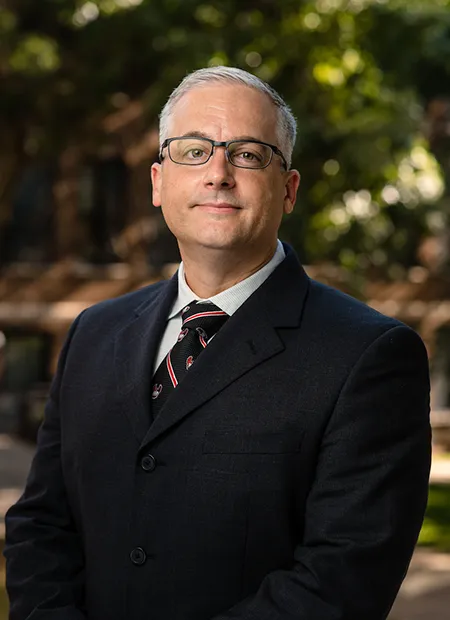
Justin Fair
As a child, Justin Fair learned that chemistry is more than test tubes and Bunsen burners. It has many unseen practical applications, including in national defense. Fair used his biochemistry degree to serve our country in the US Army. Now, he shares that expertise with his students. Learn more about him in this installment of Meet Our Faculty.
What is it about chemistry that initially drew you in—and ultimately keeps you interested?
I grew up listening to stories from my grandfather, who was an Army officer in the US Chemical Corps at the end of WWII and just after Vietnam, when a lot of research was going on concerning radiological, chemical, and biological weapons. I ultimately learned that a nation must prepare for worst-case scenarios through scientific research focused on defense and deterrence. It also provided a passion to understand science and to use research to identify answers to solve issues plaguing society.
Following in my grandfather’s footsteps, I enlisted and earned a commission in the Army. I applied my biochemistry degree on a Quick Reaction Team that specialized in weapons of mass destruction, where I assisted local, state, and federal agencies. In this position, I was able to see how all the basic chemical properties and theories were being used, which furthered my interest in learning more through scientific research.
Why do you enjoy teaching in this discipline?
My job on the Quick Reaction Team was mainly to identify unknown hazards, but I often taught my fellow soldiers chemistry, biochemistry, health, and physics. The training ignited a passion for teaching others and provided immense satisfaction when seeing my team members’ knowledge grow. I decided to get a graduate degree, where I loved teaching labs in chemistry and showing students how to apply their lecture material in real-world applications. Now at IUP, I teach organic chemistry. I enjoy making direct applications of foundational chemistry reactions and properties to explain drug synthesis and biological interactions.
What advice would you give students about how to succeed in college?
- Look at your degree as a pathway toward success. Your grit, tenacity, and perseverance will pay off!
- Learn how to study rather than simply do problems and check if they are correct.
- Find the value in studying initially by yourself and then working with a study group to further explain and learn additional perspectives to fully understand the skills the course is expecting you to know.
- Seek out opportunities and build relationships with your fellow students and faculty to help you identify those opportunities.
- Research what future employers or professional programs are looking for and use your four years to build those opportunities into your résumé.